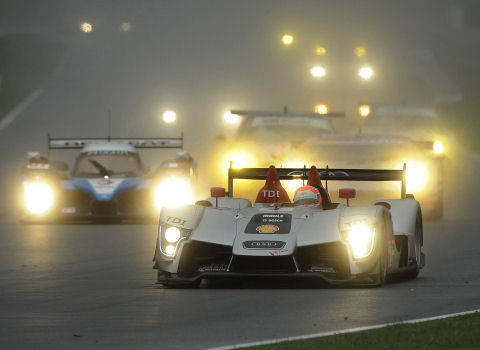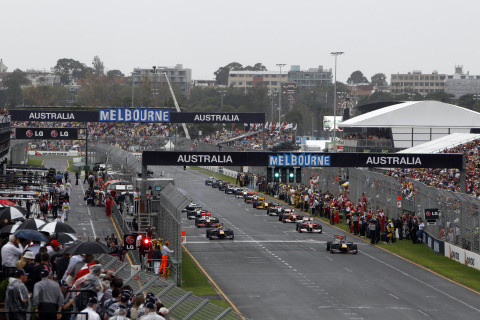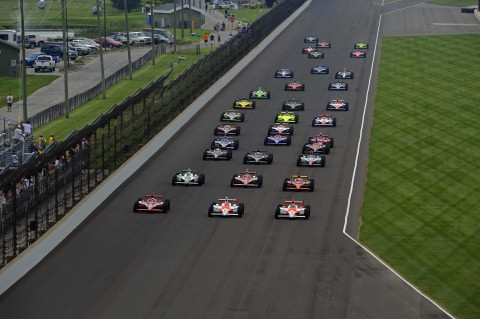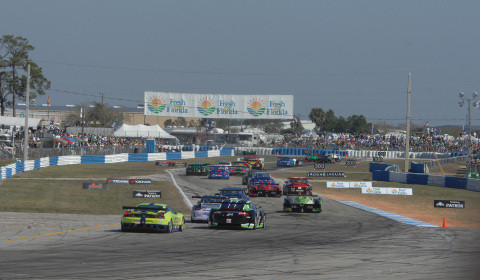The Way It is/ Pursuing the god of efficiency
by Gordon Kirby As I've written before, Audi Sport's engine boss Dr. Ulrich Baretzky is one of the racing industry's leading proponents of pursuing efficiency as the keystone of the sport's raison d'etre in the 21st century. In company with the pursuit of the great God of efficiency Baretzky is also a leading supporter of the 'Global Racing Engine'--a 1.6 liter in-line four-cylinder turbo.
As I've written before, Audi Sport's engine boss Dr. Ulrich Baretzky is one of the racing industry's leading proponents of pursuing efficiency as the keystone of the sport's raison d'etre in the 21st century. In company with the pursuit of the great God of efficiency Baretzky is also a leading supporter of the 'Global Racing Engine'--a 1.6 liter in-line four-cylinder turbo.
The idea was first proposed to the FIA three or four years ago by Peter Wright and in the last year or two support has grown steadily for the concept of a low-boost, small capacity four-cylinder engine that could be used in a wide variety of racing categories around the world. Audi's Baretzky has been actively involved in marshaling support for the 'Global Racing Engine'. He's been discussing and pushing the concept with automobile manufacturers around the world.
"Ten companies have been involved in the process," Baretzky says. "There's a clear sporting agreement between most or nearly all of the manufacturers and a lot of the sport's groups or teams that this is the way to go. But as they say, Rome was not built in one day. These things take time but there's a really big interest in the in-line, four-cylinder 1,600 cc 'Global Racing Engine'.
"One of the manufacturers immediately sent the working proposal to their president without waiting to hear from the others because they were so enthusiastic about getting it approved. But a week later Jean Todt sent out a draft of the rules for a 1,600 cc four and got it agreed to last month."

© LAT USA
"They've approved a 1.6 liter turbo direct injection four cylinder engine for the WTTC and WRC and that's the basis of the rules we've been discussing with the FIA as the 'Global Racing Engine'," Baretzky comments. "BMW, Citroen and Ford are working on developing an engine like that since July last year because they were so sure that the idea of the 'Global Racing Engine' would come. So they started before the rules were even agreed to. That shows their level of confidence in the concept. I think they will start testing their cars in the next few weeks or months.
"This was a very good, very encouraging step because 99% of the rules are based on what we call the 'Global Racing Engine'. The only difference is the bore dimension. But again, there's a lot of interest and discussion about the in-line four."
Baretzky says there's been plenty of internal discussion within the Volkswagen Group about the 'Global Racing Engine'.
"We are not alone at Audi. We have to look a little bit at what the complete Volkswagen Group wants. A little bit of my job is to talk to a lot of people and try to see what the interests and probabilities are with the 'Global Racing Engine' and try to integrate all possible options. At the end we want to have one basic engine which will allow our brands to go into one or another of a variety of categories based on the 'Global Racing Engine' proposal or something similar."
Ffollowing a hiatus conversation with the IRL has started again. Baretzky says there's still a preference within the IRL for a V-6 which is Honda's favored option.
"The IRL is discussing the 'Global Engine' again," Baretzky remarks. "There are some strong tendencies there towards a V-6 but a V-6 is not a real downsized engine. It's just another version of a big engine. Even if you have a small capacity at two liters a V-6 is the wrong thing to do because of the friction and the costs and the availability to make it a cross-mounted engine for applications other than a single-seater or monocoque sports car."

© LAT USA
"I found this a great and encouraging idea. It's a really dramatic step but I think that's what's needed. If you really want to have environmentally relevant motor sport then you have to make a big step and the Delta Wing does that. An important part of its design concept is to cut everything by two--half the horsepower, half the weight--but keep the same level of performance or even make it better. It's a drastic step and that's what you need. Even if it ends up being something different but similar, it's the right thing to do in my opinion."
Delta Wing designer Ben Bowlby flew to Sebring while Audi was testing its new R15+ a few weeks ago to discuss his ideas with Baretzky. The two men discovered they were on the same page on a wide variety of issues.
"I had some very long conversations with Ben Bowlby," Baretzky reports. "He came to Sebring to talk to me and it was a very good conversation. We have a really common concept of what has to happen in motorsport. After all the discussions I had with the IRL guys two years ago and with a lot of other companies last year concerning the 'Global Racing Engine' I think there's a huge common understanding of what has to hapen in motorsport in the near future."
Baretzky is convinced the 1.6 liter four-cylinder turbo is inevitable as motor sport's base engine.
"For sure the in-line four is the engine to come because there's so much support across the automobile industry," he says. "I think a lot of racing categories that cannot imagine it today will have this engine tomorrow because there won't be any options left anymore. Nobody will do a new V-8 stock-block engine for NASCAR. They have to learn that the time for this kind of engine is finally over."
Baretzky believes there's a solid core of people in Formula One who are ready to embrace the 'GRE'.
"I've had some quite interesting talks with some people around Formula One and they are really and seriously regarding the in-line four with a very small capacity in the area of 1,600 cc," he remarks. "They want to find an answer to change from what they have now with 220 liters of fuel onboard which they are burning for a two-hour race without any refuelling. That was the worst thing they could have done because each time a Formula One race is broadcast you will hear this discussion. If you burn 200 liters with a powerful engine it's maybe an efficient engine but for the mass media audience to burn 200 liters of fuel to go 300 kilometers is a nightmare. They ask, how can that be efficient?"

© LAT USA
"One of the most influential things about the end use of energy are the aerodynamics," Baretzky says. "If the aerodynamics of a car require 300-400 horsepower from the engine just to create the downforce to corner quick enough, that's not something you have or will ever have in a road car. In Germany we drive quite quick compared to the United States but we never had wings on our road cars. At the end of the day all this stuff is completely bullshit."
Baretzky is a big fan of 'waste energy recovery systems' and was very disappointed with the FIA's bungled introduction of KERS to F1.
"The other thing that's very important that we should not lose sight of is all kinds of waste energy recovery systems. I don't say KERS. I say waste energy recovery by using the exhaust and turbo where you really could get more efficiency into a race car. When you use a small engine like an in-line four that gives you a lot of room in the car you have a lot of possibilities with the turbocharging system to get more energy out of what you are burning.
"This is a completely new approach after the failure of KERS last year in Formula One. It was unfortunate the way it happened. The way the KERS system was set up in Formula One was wrong. If they had made the boundaries right KERS could have been a very successful beginning of an environmentally friendly motorsport, but it wasn't done right. It was a good idea but it was badly managed and badly set up."
Nevertheless, Baretzky is convinced the changing tide of the GRE will sweep across F1 as inevitably as it will through the rest of the sport.
"One thing is for sure," he says, "all the parties I talk to, whether in Formula One or whereever, they are aware of the necessity to make socially and environmentally relevant types of motorsport. They all know they cannot go on like they are now. Whoever you talk to there is no discussion about that. The necessity is clear to everybody. The conversation is about how to do it.
"In Formula One, if you want to be ready in 2013 it's high time to define the rules. If not, you end up in a similar situation with the rally and touring cars on their route for 2011. In the end, they were more or less forced to use the 'Global Racing Engine' rules because everything else would have been too late or led to a real disaster. So it was a good thing that the 'Global Racing Engine' proposal was there and they accepted it because they realized it's the only way to go forward."
Baretzky believes even NASCAR will be compelled to follow the 'GRE' road.
"I think the next type of racing that should start moving is NASCAR. I understand the number of spectators and sponsors is declining rapidly so they are in a similar situation to Formula One. They have just one choice and they have to make the right choice. If not, they are dead. It's like the dinosaur. If you don't change, you're dead.

© LAT USA
Baretzky believes motor sport is the best way to change peoples' minds.
"I think motorsport can teach people that being environmentally friendly doesn't necessarily mean you're lacking something. You just need the right technology and you don't feel a difference. The only difference you will see is when you fill up the car.
"Motorsport can really showcase that this is reality and convince people to give up their preferences for big block engines which is still a little bit prevalent and traditional in America. This is what people are used to for many decades so they don't see any sense or reason why they should change to something unknown and small that looks less powerful. People don't change their habits very easily.
"America in various regards is very conservative and it takes quite a long time for change to come. But when people decide to make a change they change dramatically quickly and if you're not prepared for that you will be wiped away."
Baretzky is in regular dialogue with the EPA and says EPA officials share his enthusiasm for 'waste energy recovery systems'.
"When we were in Sebring I had a nice conversation for an hour with some people from the EPA. We are talking regularly now at least one or two times a year. We realize we have the same vision where at the end of the day we will get an energy-based type of racing that would take whatever shape or form of energy and make power out of it. We all agree on that and there's a broad agreement that some type of waste energy recovery system should be installed to give people a real incentive to develop new technologies which could really help road cars to save fuel and make the car more efficient and more environmentally friendly."
Baretzky would love to see Audi return to the ALMS but he says many issues both technically and politically need to be resolved before a decision can be made.
"Personally, I would love to see us racing in the ALMS in America, but I am not asked for my opinion. I hope a decision will be made because if we don't make the decision to race in America in the next year or two there's a danger that the series might collapse.
"To get the manufacturers back they have to propose an attractive and acceptable environment for manufacturers to compete. Just to drive in circles and make a race is not enough anymore. The message a manufacturer wants to transport is now a different one. It's not only technology. It's also an environmentally friendly message so the rules have to be written that way."
Baretzky is pleased to see the ACO moving toward smaller displacement engines at Le Mans. But he cautions that new rules are always expensive and will affect independent teams much more so than factory operations.
"We have to make a new car for next year because the engine rules are completely changed," Baretzky comments. "There's a big step in downsizing the engines for Le Mans. It will be a new era for the Twenty-Four Hours and for all associated sports car racing categories, and this is a big step in the right direction.
"But we have to make big investments to make a new car and powertrain to the new rules. They are big investments and with all the social and economic crises we have had and still have, it's not so easy for a company to decide that, and there's no way for a small company or a privateer to do so. So they are completely dependant on the big OEMs doing something in this direction so they have a platform and engines available to race there a couple of years later.
"And as soon as a two-liter turbo shows up," he adds, "they will have a chance to win because the efficiency of the two liter turbo is far higher than a normally-aspirated V-8, no doubt about it."
Baretzky is convinced the next two or three years will determine the sport's future.
"There are risks for some established race series to disappear if they don't take the right message at the right time," he remarks. "I hope for the ALMS because it's a really fantastic series. I really enjoyed going there. The ALMS spectators are a very interested group, very constant and intelligent people. I enjoyed a lot of discussions over a couple of years in the ALMS with people about technology and about diesel engines and the environment. It's different, I think, from other race series in America.
"But it has to provide interesting and thrilling racing. If the racing is boring for two or three years in a row a lot of people will decide not to go again. You see the decline in interest in other categories from F1 to NASCAR. We are really on the edge of falling down like a dead puppy. We really need to make the right decisions very quickly."
Amen to all that.
Auto Racing ~ Gordon Kirby
Copyright 2010 ~ All Rights Reserved
Copyright 2010 ~ All Rights Reserved
Top of Page